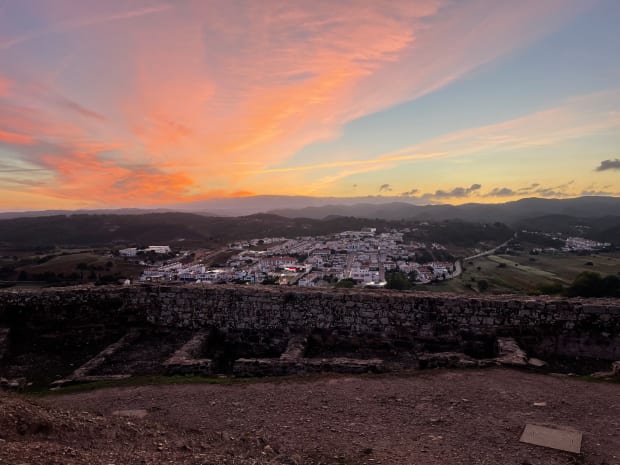Portugal’s beautiful landscape, freedom-minded people and friendly legislation make it a perfect Bitcoin homeland.
This is an opinion editorial by Holly Young, Ph.D., an active builder in the Portuguese Bitcoin community.
Way back when people thought the earth was flat, it was more or less here, in Portugal where I am writing this, that people thought that the earth ended. And if you look out to the sea, you can understand why, as the gray Atlantic stretches as far as the eye can see to America in one direction, and to North Africa in another. Names referring to the edge of the earth (“Fisterra,” “Finisterre”) are common along the Atlantic coastline.

Portugal’s visa process, for those of us who are not European, although somewhat slow, is manageable and does not necessarily involve parting with too large a slice of your Bitcoin stash. A D7 visa, for example, requires only that you display means of income or passive income (and yes, they consider holding Bitcoin as a means of passive income) and the equivalent of two years of minimum wage on your bank account.
For anyone who has ever visited, I hardly need to expand upon the charms of Portugal. The climate, beautiful landscape, food, incredibly friendly and warm culture all speak for themselves. It is much less focussed on keeping up appearances and status than its Mediterranean sister countries, Italy and Spain. For those keen to live a healthy, outdoor life, be it hiking, surfing, motorbiking or horseback riding — you name it, Portugal is paradise. For those wanting to raise a family here, it’s generally a safe environment, with low crime rates, decent healthcare, some outstanding international schools and a lively home schooling or alternative schooling community.
There is something about Portugal’s history which lends it to being a Bitcoin haven, too. The country was under a dictatorship from the mid 1920s until the mid 1970s, meaning that political oppression and censorship are still very much living memories amongst the local population. Poverty was the norm here, especially before it joined the European Union in the ‘80s, and still Portugal remains one of the poorer European countries.
An influx of Bitcoiners inevitably brings more affluence with it, nourishing the local economies. Portugal’s history, attractive lifestyle and Bitcoin-friendly tax laws make it fertile ground in and of itself for a Bitcoin community.
And then you have the types of people which Portugal has always attracted as immigrants.
Those of us who have washed up and put down roots here in Europe’s deep south do, it seems to me, have some common characteristics. Many of us came to take our children away from the rigid and constrictive school systems of Northern Europe. Many have bought land and are keen to move towards self sufficiency. Many are digital nomads, looking for community — this is especially true further north, in Lisbon. Many are people who work with their hands and make goods to sell. In general, Portugal draws and has always drawn a freedom-minded crowd, when it comes to immigrants. And I can tell you from experience that these people are natural Bitcoiners. Orange pilling here is preaching to the choir, even though many had never heard of bitcoin. Ask them if they would like a decentralized, deflationary, censorship resistant money and the answer is a resounding, “yes!”
None of us know, of course, what the future is going to bring, but whatever it brings, it seems that we should not underestimate the human value of our peer-to-peer network. What I enjoyed the most about the brief period I spent at Bitcoin Beach in El Salvador was the international crowd who wanted nothing more than to talk Bitcoin over dinner. But the benefits of having an active Bitcoin community are not only social ones. We can all see that difficult times are coming with hyperinflation and shortages — for these issues, only parallel economies provide a realistic solution.
During COVID-19, some friends of mine set up what they called a private market on their land. In no time, the first 10 stalls had expanded and there were several hundred shoppers when I visited. Stalls sold local honey, mushrooms, clothing, biochar burners, eggs, meat, jewelry, local liquor, candles and brass ornaments. People offered circus workshops for children, clothing repair — there was live music and a festive atmosphere. Initiatives like this are perfect for introducing bitcoin as the ideal currency for a parallel, local economy, with all the advantages offered by Lightning. As Bitcoiners, we need to actively grasp these opportunities. I’ll be holding a “Bitcoin for Beginners” workshop in the short term, organized through the Telegram group for the market.
On a beach down on the southern coast, Meia Praia, the first green shoots of Bitcoin Beach Europe are starting to sprout. So far, it’s just one little beach bar. But if you go to Bam Bam Beach bar on a Friday evening, you will find live music and an active, international crowd of Bitcoiners there, swapping tales and paying for their cold beers with Lightning. Other initiatives are slowly springing up too. The farm shop owned by a dear friend of mine also accepts sats as payment. A pizzeria down on the south coast in Burgau does too. So does a steakhouse in Almancil. One by one, Bitcoin businesses are appearing and flourishing.
To the European Bitcoiner, the U.S. looks like an enviable hub of Bitcoin meetups, with a tempting array of get-togethers on a regular basis, especially in Nashville and Austin. Here in Europe, we have to work a little harder to get our Bitcoin contact time and our Bitcoin chats in. But there has never been a better time for European Bitcoiners to gather and start holding meetups, information sessions and to start building communities.
Family is first — community is a close second. Just as the integrity of family relationships requires time, effort, commitment and attention, so too does building and keeping a community. Portugal provides the welcome we need for a European Bitcoin community and economy — it has the potential to be Europe’s Bitcoin heartland. But the most vital thing is that we all do our best to contribute to the orange tsunami which hyperbitcoinization will be. “Build back better,” say our politicians, and I wholeheartedly agree — by defunding their regimes, by opting out, by buying bitcoin, by helping those around us to buy bitcoin and by building the community we want to live in ourselves, from the ground up.
This is a guest post by Holly Young. Opinions expressed are entirely their own and do not necessarily reflect those of BTC Inc or Bitcoin Magazine.
